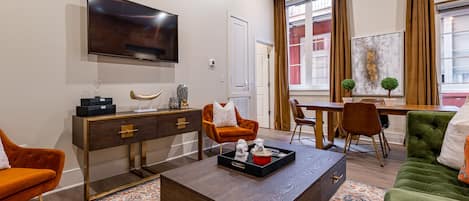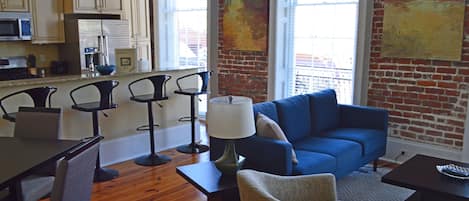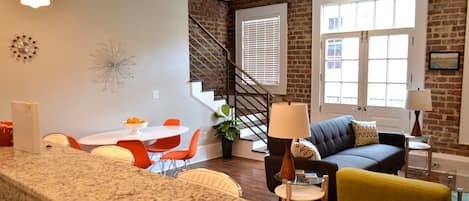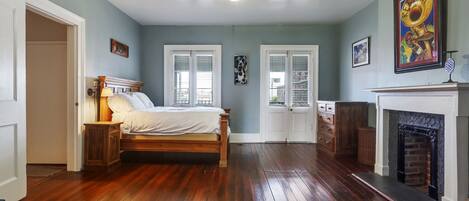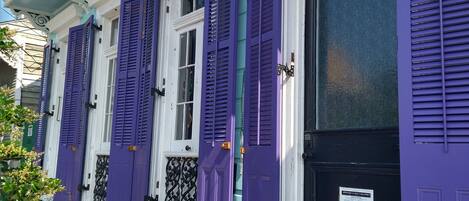Apartment
Stylish Escape in Historic Warehouse District
Apartment with kitchen, 5-minute walk to National World War II Museum
Photo gallery for Stylish Escape in Historic Warehouse District





Reviews
9.8 out of 10
Exceptional
2 bedrooms2 bathroomsSleeps 41400 sq ft
Popular amenities
Explore the area

New Orleans, LA
- Place, National World War II Museum5 min walk
- Place, Ernest N. Morial Convention Center8 min walk
- Place, Julia Street Cruise Terminal11 min walk
- Airport, New Orleans, LA (MSY-Louis Armstrong New Orleans Intl.)20 min drive
Rooms & beds
2 bedrooms (sleeps 4)
Bedroom 1
1 King Bed
Bedroom 2
1 Queen Bed
2 bathrooms
Bathroom 2
Toilet · Shower only
Master Bath
Bathtub or shower · Toilet · Jetted bathtub
Spaces
Deck or patio
Kitchen
Balcony
Dining area
About this property
Stylish Escape in Historic Warehouse District
The elegant townhouse at 838 Camp Street was designed by James Harrison Dakin (1806-1852), an influential architect in New Orleans who also designed the landmark St. Patrick’s Cathedral down the street. The land was first owned by Gasquet, Parish & Co., a commission merchant company largely responsible for the initial development of the American Sector. Construction on this townhouse, originally one of nine sister “rowhouses,” began in the early 1840s.
The first known inhabitant of the townhouse was Walter Cox, a cotton merchant and owner of the cotton firm W. Cox & Co. established in 1858. It appears that the Civil War resulted in Cox’s firm going bankrupt, as his home was sold in a sheriff’s auction in 1867. The house was purchased by attorney Alfred J. Philips, partner in the esteemed New Orleans firm of Roselins & Philips. Sometime during the 1870s, ownership of the property transferred from Philips to his brother-in-law, influential attorney John Blackstone Cotton from Georgia, who married Alfred’s younger sister Sophia in 1852. Blackstone served as a New Orleans City Attorney in 1850, as a District Judge (1853-1857) and as Superintendent of Elections (1857-1858). During the Civil War, Cotton served as a Confederate Army Officer from 1861 until he fell ill in the field in 1862.
Margaret Robinson Barnett (1887–1977) purchased the property in May of 1921. Margaret owned and operated “Dixie Stove Works” out of what is now the property’s commercial space at 840 Camp. The company boasted itself as “the South’s largest manufacturer of stove parts.” Margaret and her husband also housed “Roomers” in the properties residential units beginning in 1930. These renters hailed from such varied places as Germany, New York, Louisiana, Minnesota, and South Dakota. The residence had become primarily commercial in the latter half of the 20th century, with Dixie Stove Works as its last commercial occupant.
The first known inhabitant of the townhouse was Walter Cox, a cotton merchant and owner of the cotton firm W. Cox & Co. established in 1858. It appears that the Civil War resulted in Cox’s firm going bankrupt, as his home was sold in a sheriff’s auction in 1867. The house was purchased by attorney Alfred J. Philips, partner in the esteemed New Orleans firm of Roselins & Philips. Sometime during the 1870s, ownership of the property transferred from Philips to his brother-in-law, influential attorney John Blackstone Cotton from Georgia, who married Alfred’s younger sister Sophia in 1852. Blackstone served as a New Orleans City Attorney in 1850, as a District Judge (1853-1857) and as Superintendent of Elections (1857-1858). During the Civil War, Cotton served as a Confederate Army Officer from 1861 until he fell ill in the field in 1862.
Margaret Robinson Barnett (1887–1977) purchased the property in May of 1921. Margaret owned and operated “Dixie Stove Works” out of what is now the property’s commercial space at 840 Camp. The company boasted itself as “the South’s largest manufacturer of stove parts.” Margaret and her husband also housed “Roomers” in the properties residential units beginning in 1930. These renters hailed from such varied places as Germany, New York, Louisiana, Minnesota, and South Dakota. The residence had become primarily commercial in the latter half of the 20th century, with Dixie Stove Works as its last commercial occupant.
Add dates for prices
Amenities
Kitchen
Washing machine
Dryer
Pet-friendly
Free WiFi
Air conditioning
Have a question?
Get instant answers with AI powered search of property information and reviews.
Similar properties

🎷Luxury Historic Downtown Location LG Private Balcony | The Armstrong 🎷
🎷Luxury Historic Downtown Location LG Private Balcony | The Armstrong 🎷
- Kitchen
- Washing machine
- Dryer
- Air-conditioning
10.0 out of 10, Exceptional, (155 reviews)
House Rules
Check in after 3:00 PM
Check out before 11:00 AM
Children
Children allowed: ages 0–17
Events
No events allowed
Pets
Pets allowed: dogs (limit 1 total)
Contact us for more information.
Smoking
Smoking is not permitted
Important information
You need to know
Extra-person charges may apply and vary depending on property policy
Government-issued photo identification and a credit card, debit card or cash deposit may be required at check-in for incidental charges
Special requests are subject to availability upon check-in and may incur additional charges; special requests cannot be guaranteed
On-site parties or group events are strictly prohibited
Host has indicated that there is a carbon monoxide detector on the property
Host has indicated that there is a smoke detector on the property
Safety features at this property include a fire extinguisher
Property Registration Number 23-OSTR-20491, 21-CSTR-12112
We should mention
A car is not required for transport to and from this property
About the area
New Orleans
Located in New Orleans, this apartment is in the city centre. National World War II Museum and Saenger Theatre are cultural highlights, and some of the area's activities can be experienced at Port of New Orleans and Julia Street Cruise Terminal. Looking to enjoy an event or a game? See what's going on at Caesars Superdome or Smoothie King Center. Discover the area's water adventures with nearby fishing, or enjoy the great outdoors with cycling.

New Orleans, LA
What's nearby
- National World War II Museum - 5 min walk - 0.5 km
- Magazine Street - 7 min walk - 0.6 km
- Ernest N. Morial Convention Center - 8 min walk - 0.7 km
- Canal Street - 10 min walk - 0.9 km
- Julia Street Cruise Terminal - 11 min walk - 1.0 km
Getting around
Restaurants
- Flamingo A-Go-Go - 2 min walk
- Pêche Seafood Grill - 2 min walk
- Bearcat CBD - 5 min walk
- The American Sector - 5 min walk
- Junebug - 2 min walk
Frequently asked questions
Reviews
9.8
Exceptional
Reviews are presented in chronological order, subject to a moderation process, and verified unless otherwise labelled.
Learn moreOpens in a new window9.6/10
Cleanliness
10/10
Check-in
10/10
Communication
10/10
Location
10/10
Listing accuracy
Reviews
18 Dec, 2025
Liked: Cleanliness, check-in, communication, location, listing accuracy
Stayed 7 nights in Dec 2025
10/10 Excellent
Carolyn P., Florida
23 Dec, 2022
Liked: Cleanliness, check-in, communication, location, listing accuracy
Fantastic stay
Carolyn P.
Stayed 4 nights in Dec 2022
10/10 Excellent
Kathi K.
21 Nov, 2024
Liked: Cleanliness, check-in, communication, location, listing accuracy
This property made the Big Easy very Easy!
Kathi K.
Stayed 3 nights in Nov 2024
8/10 Good
Jon C.
14 Jul, 2023
Liked: Cleanliness, check-in, communication, location, listing accuracy
Great location
Jon C.
Stayed 4 nights in Jun 2023
10/10 Excellent
Craig R.
29 Sept, 2024
Liked: Cleanliness, check-in, communication, location, listing accuracy
Historical Gem in NOLA
Craig R.
Stayed 3 nights in Sep 2024
10/10 Excellent
Rachel H.
18 Apr, 2024
Liked: Cleanliness, check-in, communication, location, listing accuracy
Wonderful VRBO
Rachel H.
Stayed 2 nights in Apr 2024
10/10 Excellent
Steven M.
27 Dec, 2022
Liked: Cleanliness, check-in, communication, location, listing accuracy
What a amazing place to stay!!
Steven M.
Stayed 3 nights in Dec 2022
10/10 Excellent
Charlene H.
13 May, 2023
Liked: Cleanliness, check-in, communication, location, listing accuracy
New Orleans
Charlene H.
Stayed 4 nights in May 2023
10/10 Excellent
Lauren S.
12 Feb, 2023
Liked: Cleanliness, check-in, communication, location, listing accuracy
Beautiful place
Lauren S.
Stayed 7 nights in Feb 2023
10/10 Excellent
James T.
18 Nov, 2023
Liked: Cleanliness, check-in, communication, location, listing accuracy
Lovely New Orleans Style Residence
James T.
Stayed 5 nights in Nov 2023
8/10 Good
KLE L.
28 Oct, 2024
Liked: Cleanliness, check-in, communication, location, listing accuracy
Birthday weekend
KLE L.
Stayed 2 nights in Oct 2024
10/10 Excellent
Shane W.
5 Jan, 2025
Liked: Cleanliness, check-in, communication, location, listing accuracy
New Years 2025
Shane W.
Stayed 4 nights in Dec 2024
10/10 Excellent
GERMAN M.
26 Jun, 2024
Liked: Cleanliness, check-in, communication, location, listing accuracy
Great place!!!
GERMAN M.
Stayed 8 nights in Jun 2024
10/10 Excellent
Melanie A.
5 Apr, 2024
Liked: Cleanliness, check-in, communication, location, listing accuracy
Great short stay
Melanie A.
Stayed 2 nights in Apr 2024
10/10 Excellent
joe f.
15 Jun, 2024
Liked: Cleanliness, check-in, communication, location, listing accuracy
Wonderful property
joe f.
Stayed 5 nights in Jun 2024
10/10 Excellent
Heather P.
23 May, 2024
Liked: Cleanliness, check-in, communication, location, listing accuracy
Amazing space
Heather P.
Stayed 6 nights in Apr 2024
10/10 Excellent
Verified traveller
10 Nov, 2023
Liked: Cleanliness, check-in, communication, location, listing accuracy
New Orleans vibe in a great neighbourhood
Verified traveller
Stayed 3 nights in Oct 2023
This review was submitted before 2018 and has not been verified.
6/10 Okay
Mark B.
19 Mar, 2017
Great for a guys weekend!
Mark B.
Stayed 3 nights in Feb 2017
10/10 Excellent
Cindy A.
23 Mar, 2024
Liked: Cleanliness, check-in, communication, location, listing accuracy
Enjoyed our time
Cindy A.
Stayed 5 nights in Mar 2024
10/10 Excellent
Sonya R.
29 Jul, 2023
Liked: Cleanliness, check-in, communication, location, listing accuracy
New Orleans charm
Sonya R.
Stayed 3 nights in Apr 2023
10/10 Excellent
Lyn T.
17 Oct, 2023
Liked: Cleanliness, check-in, communication, location, listing accuracy
Home away from home
Lyn T.
Stayed 4 nights in Oct 2023
10/10 Excellent
Katie K.
11 Nov, 2023
Liked: Cleanliness, check-in, communication, location, listing accuracy
Quiet, Warehouse District Apartment
Katie K.
Stayed 4 nights in Oct 2023
10/10 Excellent
Clay F.
1 Dec, 2022
Liked: Cleanliness, check-in, communication, location, listing accuracy
Family holiday getaway
Clay F.
Stayed 5 nights in Nov 2022
10/10 Excellent
Bonnie G., Lafayette,La
22 Nov, 2022
Liked: Cleanliness, check-in, communication, location, listing accuracy
Daughter’s Wedding
Bonnie G.
Stayed 4 nights in Nov 2022
10/10 Excellent
Eric F.
18 Oct, 2022
Liked: Cleanliness, check-in, communication, location, listing accuracy
Great Trip
Eric F.
Stayed 7 nights in Oct 2022
About the host
Hosted by Damon
I have lived in New Orleans for past thirty years. Whether you are a family or large group coming for an event or a getaway or a couple wanting to stay near the French Quarter I have many options across my portfolio of properties. We treat our guests like family and do everything to address problems and do maintenance to prevent problems from arising. I love when guests have an incredible experience and appreciate my curation of historical and modern photos capturing the history of the properties great City of New Orleans. All of our staff live in the City and are ready to answer any questions about nearby points of interest and attractions.
Why they chose this property
The elegant townhouse at 838 Camp Street was designed by James Harrison Dakin (1806-1852), an influential architect in New Orleans who also designed the landmark St. Patrick’s Cathedral down the street. The land was first owned by Gasquet, Parish & Co., a commission merchant company largely responsible for the initial development of the American Sector. Construction on this townhouse, originally one of nine sister “rowhouses,” began in the early 1840s.
The first known inhabitant of the townhouse was Walter Cox, a cotton merchant and owner of the cotton firm W. Cox & Co. established in 1858. It appears that the Civil War resulted in Cox’s firm going bankrupt, as his home was sold in a sheriff’s auction in 1867. The house was purchased by attorney Alfred J. Philips, partner in the esteemed New Orleans firm of Roselins & Philips. Sometime during the 1870s, ownership of the property transferred from Philips to his brother-in-law, influential attorney John Blackstone Cotton from Georgia, who married Alfred’s younger sister Sophia in 1852. Blackstone served as a New Orleans City Attorney in 1850, as a District Judge (1853-1857) and as Superintendent of Elections (1857-1858). During the Civil War, Cotton served as a Confederate Army Officer from 1861 until he fell ill in the field in 1862.
Margaret Robinson Barnett (1887–1977) purchased the property in May of 1921. Margaret owned and operated “Dixie Stove Works” out of what is now the property’s commercial space at 840 Camp. The company boasted itself as “the South’s largest manufacturer of stove parts.” Margaret and her husband also housed “Roomers” in the properties residential units beginning in 1930. These renters hailed from such varied places as Germany, New York, Louisiana, Minnesota, and South Dakota. The residence had become primarily commercial in the latter half of the 20th century, with Dixie Stove Works as its last commercial occupant.
The first known inhabitant of the townhouse was Walter Cox, a cotton merchant and owner of the cotton firm W. Cox & Co. established in 1858. It appears that the Civil War resulted in Cox’s firm going bankrupt, as his home was sold in a sheriff’s auction in 1867. The house was purchased by attorney Alfred J. Philips, partner in the esteemed New Orleans firm of Roselins & Philips. Sometime during the 1870s, ownership of the property transferred from Philips to his brother-in-law, influential attorney John Blackstone Cotton from Georgia, who married Alfred’s younger sister Sophia in 1852. Blackstone served as a New Orleans City Attorney in 1850, as a District Judge (1853-1857) and as Superintendent of Elections (1857-1858). During the Civil War, Cotton served as a Confederate Army Officer from 1861 until he fell ill in the field in 1862.
Margaret Robinson Barnett (1887–1977) purchased the property in May of 1921. Margaret owned and operated “Dixie Stove Works” out of what is now the property’s commercial space at 840 Camp. The company boasted itself as “the South’s largest manufacturer of stove parts.” Margaret and her husband also housed “Roomers” in the properties residential units beginning in 1930. These renters hailed from such varied places as Germany, New York, Louisiana, Minnesota, and South Dakota. The residence had become primarily commercial in the latter half of the 20th century, with Dixie Stove Works as its last commercial occupant.
What makes this property unique
This is a one of kind property in the perfect location to walk or take short Uber rides to all of the City's best attractions.
Languages:
English, Spanish
Premier Host
They consistently provide great experiences for their guests
Tell us how we can improve our siteShare feedback


